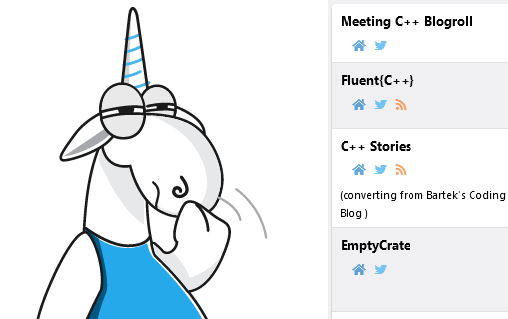Readers surely have favorite websites and blogs about C++. Hopefully, today your collection will grow.
Actually, Internet doesn't lack interesting C++ websites. On the contrary, there are lots of them. For example, here are some good collections about C++:

I think you guessed that I decided not to be hard on you :). These three lists contain 50+ various websites, blogs, and other collections!
Some of the links from the list lead to dead blogs, others — to active websites.
What should we do with it? Be happy that many fascinating websites about development exist in this world :). I suggest you look through it. Maybe something will catch your attention.
Wait, but why did I write this article? Do you think I want to be helpful? On the contrary — I'm on the dark side! I created another small list of riveting websites for C++ developers. The list is not even near to objectiveness and universality. But I'm sure someone will like it too.

Link: https://www.fluentcpp.com/
Hello, my name is Jonathan Boccara, I'm your host on Fluent C++. I have been a developer for 10 years. My focus is on how to write expressive code.
An interesting and active blog on C++. True fans can ever purchase a t-shirt :).
Link: https://www.modernescpp.com/
Rainer Grimm — the blog author — is very active in various directions:
In my spare time, I like to write articles about C++, Python, and Haskell. I also like to speak at conferences. I publish weekly on my English Modernes Cpp and the German blog, hosted by Heise Developer.
Besides, he's also a corporate trainer and a coach:
Through an individually tailored coaching for your company, I can help you to become fit for modern C++ and modern software development. I combine classical face-to-face training with individual adapter training units.
If you want to boost your skills, you know where to go :).
Link: https://arne-mertz.de /
Instead, "Simplify C++!" is an appeal to many users of the language who tend to think too complicated when things could be done in a simple manner. It is about polishing the image of a language that is often seen as too hard to master by novice programmers and as an ancient, monstrous survivor of the old days by seasoned developers. It is about using advanced features where they are necessary and useful instead of everywhere where they are possible.
If you write a cool article, you can post it there as a Guest Post. I've already done that: "Macro Evil in C++ Code".
Link: https://herbsutter.com/
Author, chair of the ISO C++ standards committee, and native languages architect at Microsoft.
A fundamental blog with lots of videos. It's up to you to decide whether to read it or to watch it.
Website: https://devblogs.microsoft.com/oldnewthing/
Raymond has been involved in the evolution of Windows for more than 25 years. In 2003, he began a Web site known as The Old New Thing which has grown in popularity far beyond his wildest imagination, a development which still gives him the heebie-jeebies. The Web site spawned a book, coincidentally also titled The Old New Thing (Addison Wesley 2007).
I could have given you a general link to Microsoft Developer Blogs. But I like "The Old New Thing" more. A lot of funny stories about developing — something happened and something turned out to be good.
My first acquaintance with this blog was in 2005. I stumbled upon "Why did the Win64 team choose the LLP64 model?" when we were just thinking about a tool to detect 64-bit errors. Later, this tool turned into PVS-Studio.
Website: https://cppcast.com /
CppCast is the first podcast for C++ developers by C++ developers! Since 2015 CppCast has been having (almost) weekly conversations with C++ conference speakers, library authors, writers, ISO committee members and more! If you're interested in being a guest on CppCast please reach out to us at feedback@cppcast.com!
Our favorite C++ podcast. I may be biased here. Since we buy paid promotion from them, I want more people to listen to these podcasts :). But I assure you, the podcast hosts and guests discus really interesting C++ topics.
We sometimes make text versions for episodes.
Website: https://isocpp.org/
The home of Standard C++ on the web — news, status and discussion about the C++ standard on all compilers and platforms.
Aggregator of the most interesting and useful things on the topic of C++:
This platform alone is enough to catch up with news about C++.
Website: https://godbolt.org/
Compiler Explorer is an interactive compiler exploration website. Edit code in C, C++, Rust, Go, D, Haskell, Swift, Pascal, ispc, Python, Java or in any of the other 31 supported languages, and see how that code looks after being compiled in real time. Multiple compilers are supported for each language, many different tools and visualizations are available, and the UI layout is configurable.
It's not a blog. It's a completely different thing. Here you can quickly see online how various compilers work, what assembler listing they generate, what errors/warnings they issue. This site is not only for C or C++ developers, but for all developers in general. It is difficult to describe the use cases, as they are incredibly diverse. But I assure you, if you know about this website, you'll use it.
For example, out team uses the Compiler Explorer functionality to quickly experiment with the PVS-Studio analyzer's capabilities: Online Examples (C, C++).
Agree, it would be strange to write about other people's blogs without mentioning our own :). We regularly write articles about checking open-source projects and theoretical stuff. Reading our blog, you can notice a lot of erroneous patterns revealed on code reviews and become the coolest reviewer. A couple of articles for example:
If you use twitter, you may want to subscribe to someone from this note.
Yes-yes, I know that this note is a bit outdated. I'll make a new version sometime. But take a look anyway.

Now, with this whole COVID-19 fuss, many conferences have been canceled or held online. Nevertheless, if not now, then later you may be interested in the following C++ conferences.
Thank you for reading.
0